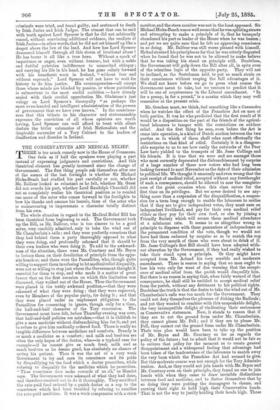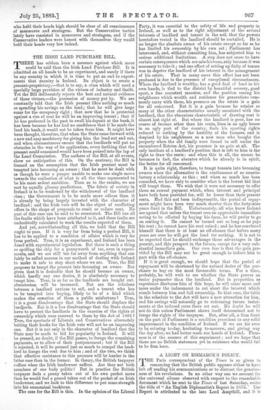THE CONSERVATIVES AND MEDICAL RELIEF.
THFRA is too much comedy now in the House of Commons. One feels as if half the speakers were playing a part instead. of expressing judgments and convictions. And this theatrical element has greatly increased since the change of Government. The first thing people ask themselves after one of the scenes of the last fortnight is whether Sir Michael Hicks-Beach had studied his part carefully or not, whether Mr. Balfour looked as reluctant as he felt, whether Mr. Gorst did. not overdo his part, whether Lord Randolph Churchill did not so completely realise his theatrical position as to remind one more of the actor who comes forward to the footlights to bow his thanks and assume his laurels, than of the actor who is endeavouring to impersonate a character totally distinct from his own.
The whole situation in regard to the Medical Relief Bill has been theatrical from beginning to end. The Government took up the Bill, as Mr. Balfour, who is too sincere to be a good actor, very candidly admitted, only to take the wind out of Mr. Chamberlain's sails ; and they were perfectly conscious that they. had behind them a party thoroughly opposed to what they were doing, and profoundly ashamed that it should be their own leaders who were doing it. To add to the awkward- nos- of the situation, there were Mr. Courtney and Mr. Bryce to lecture them on their dereliction of principle from the oppo- site benches; and there were the Parnellites, who, though quite willing to support them in refusing to let medical relief disqualify, were not so willing to stop just where the Government thought it essential for them to stop, and who made it a matter of great favour that on the first occasion on which this limitation was discussed, they walked out of the House. Thus the Government were placed in the trebly awkward position,—that they were ashamed of what they were doing ; that they were reproved, even by Members of the popular party, for doing it ; and that they were placed under an unpleasant obligation to the Parnellites for consenting to ignore, though only for a time, the half-and-half character of the Tory concession. The Government must have felt, before Thursday evening was over, that half-and-half policies are mistakes,—that it is childish to give a man medicine without disfranchising him for it, and yet to refuse to give him medically ordered food. There is really no tangible difference between medicines and comforts. Brandy is as much a medicine as a comfort ; and milk and beef-tea are often the only hopes of the doctor, who—.in a typhoid case for example—if he cannot give as much fresh milk and as much beef-tea as he deems good, has absolutely no chance of saving his patient. Thus it was the act of a very weak Government to try and save its conscience and its pride by disqualifying for the food which a doctor prescribes, while refusing to disqualify for the medicine which he prescribes. "Thus conscience does make cowards of us all," as Hamlet says. The Government were ashamed of what they had done, and therefore resolved not to do it thoroughly. They sacrificed the rate-paid. food ordered by a parish doctor as a sop to the conscience which had been troubled by refusing to sacrifice the rate-paid medicine. It was a weak compromise with a stern monitor, and the stern monitor was not in the least appeased. Sir Michael Hicks-Beach was so well aware that he was splitting straws and attempting to make a principle of it, that he brusquely abandoned his part as leader of the House when he was beaten ; and yet we are quite sure that he felt no approving conscience in so doing. Mr. Balfour was still worse pleased with himself. He had strained his principles so fax that he was utterly disgusted when he found that he was not to be allowed to make believe that he was taking his stand on principle still. Doubtless, the Government will gulp down the Bill after all, in spite even of the relentless logic of the opposite party. They will not be inclined, as the Scotchman said, to put so much strain on their consciences without reaping the full advantages of it. We shall not know before we go to press what course the Government mean to take, but we venture to predict that it will be one of acquiescence in the Liberal amendment. "In for a penny, in for a pound," is a maxim which they may well remember at the present crisis.
Mr. Goschen must, we think, feel something like a Cassandra when he watches the effect of the Franchise Act on men of both parties. It was he who predicted that the first result of it would be a disposition on the part of the friends of the agricul- tural labourers to tamper with the restrictions on outdoor relief. And the first thing he sees, even before the Act is come into operation, is a kind of Dutch auction between the two parties as to which of them shall relax most effectually the restrictions on that kind of relief. Certainly it is a disagree- able surprise to us to see how easily the outworks of the Poor Law have yielded to the trumpets of Mr. Jesse Collings and his friends. It is true that we were and are amongst those who most earnestly deprecated the disfranchisement by surprise of a large number of those new voters who had long been looking forward to next November as the date of their admission to political life. We thought it unseemly and even wrong that the past receipt of medical relief, accepted without any forethought of such a consequence, should be allowed to mar the complete- ness of the great occasion when this class enters for the first time on its privileges. But we never desired to see any- thing more than a suspension of the disqualification, a suspen- sion for a term long enough to enable the labourers to realise that if they are to give independent votes, they must earn an independent livelihood, and pay for their own medical relief either as they pay for their own food, or else by joining a Friendly Society which will secure them medical attendance at a minimum rate. It seems to us altogether wrong in principle to dispense with these guarantees of independence as the permanent condition of the vote, though we would not have had them enforced by surprise so as to snatch the cup from the very mouth of those who were about to drink of it. Mr. Jesse Collings's first Bill should have been adopted with- out alteration by the Government, if they had really wished to take their stand upon a principle. Or they might have accepted from Mr. Acland his very sensible and moderate amendment. There is reason in saying that no man ought to lose his vote only for want of due warning that the accept- ance of medical relief from the parish would disqualify him. But there is no reason in saying that, when fairly warned of that consequence, he shall still be entitled to accept medical relief from the parish, without any detriment to his political rights. Doubtless the truth is that the desire to take the wind out of Mr. Chamberlain's sails was too much for the Government. They could not deny themselves the pleasure of dishing the Radicals ; and yet they wanted to combine with this unspeakable delight, the very incompatible delight of vindicating their seriousness as Conservative statesmen. Now, it stands to reason that if they are to cut the ground from under Mr. Chamberlain, they cannot please Mr. Pell ; and if they are to please Mr. Pell, they cannot cut the ground from under Mr. Chamberlain. Their true plan would have been to take up the position of Mr. Bryce and Mr. Courtney so far as . regards the policy of the future ; but to admit that it would not be fair so to enforce that policy for the moment as to create general disappointment and a widespread feeling that advantage had been taken of the inadvertence of the labourers to snatch away the very boon which the Franchise Act had seemed to give. But this moderate course was not enough for the Tory Adminis- tration. And, as they would not join hands with Mr. Bryce and Mr. Courtney even on their principle, they found no one to join hands with when they came to draw invisible distinctions between food and medicine, and to flatter themselves that by so doing they were putting the demagogue to shame, and earning their right to hold high their Conservative heads. That is not the way to justify holding their heads high. Those who hold their heads high should be clear of all consciousness of manoeuvre and stratagem. But the Conservative tactics lately have consisted in manoeuvre and stratagem, and if the Conservative leaders were honest with themselves they would hold their heads very low indeed.



































 Previous page
Previous page